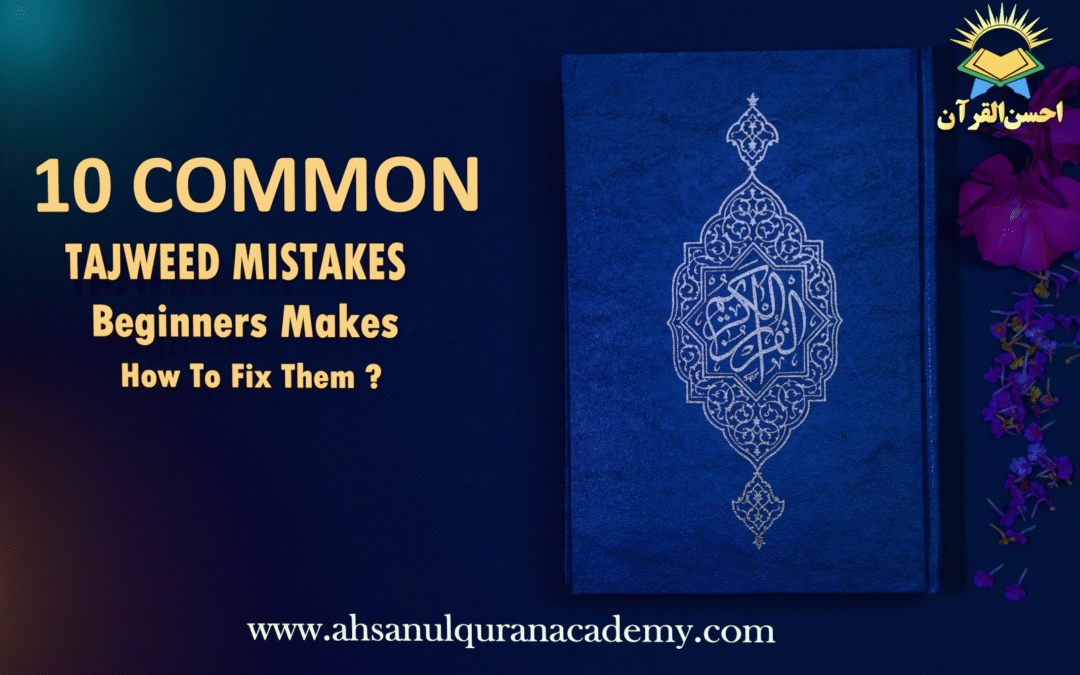
by ahsanulquranacademyadmin | Nov 18, 2025 | Blog
Learning the Qur’an is a lifelong journey—beautiful at every stage, whether you are a child taking your first steps into Noorani Qaida or an adult returning to Allah ﷻ with a renewed heart. Both paths are blessed, but they are not the same. Kids and adults learn differently, face different challenges, and require different teaching approaches.
In this blog, we will explore how Qur’an learning differs for children and adults, what advantages each group has, what challenges they face, and how both can progress effectively—In shā’ Allāh.
Whether you are a parent planning Qur’an classes for your child or an adult thinking about starting your own journey, this guide will help you understand the best path forward.
1. Learning Ability: Natural Absorption vs. Conscious Effort
Kids: Absorb like a sponge
Children have incredible neuroplasticity—the ability to absorb sounds, accents, and patterns easily. That is why kids often:
- Pick up Tajweed rules naturally
- Memorize verses quickly
- Develop correct pronunciation effortlessly
This natural ability makes childhood the best time for foundational training, especially in:
- Makharij (pronunciation)
- Tajweed basics
- Noorani Qaida
- Short surahs
Adults: Learn with purpose and understanding
Adults, on the other hand, rely less on natural absorption and more on:
- Intention
- Understanding
- Logical reasoning
- Life experience
This gives adults a huge advantage in:
- Understanding tafseer
- Reflecting on verses
- Building consistency
- Applying Qur’anic lessons in real life
Adults may learn pronunciation slower, but they grasp meanings far deeper, which strengthens their connection to the Qur’an.
2. Attention Span and Motivation
Kids: Require engaging learning
Children have shorter attention spans. They learn best when:
- Learning feels fun
- Teachers use activities or stories
- Sessions are shorter
- Progress is celebrated
Kids are also often motivated by:
- Praise
- Games
- Stars/rewards
- Parental involvement
Adults: Have discipline, but face real-life distractions
Adults are motivated by:
- Spiritual goals
- Personal growth
- A desire to reconnect with Allah ﷻ
However, they face challenges such as:
- Work
- Family responsibilities
- Stress
- Time limitations
Adults need:
- Flexible schedules
- Supportive teachers
- Structured plans
- Accountability
This is why online Qur’an classes are becoming a preferred option for adult learners.
(You may explore: Best Online Quran Classes → https://ahsanulquranacademy.com/best-online-quran-classes/)
3. Learning Style and Pace
Kids: Slow, repetitive, foundational learning
Children require:
- Step-by-step learning
- Repetition
- Visual aids
- Constant revision
- Gentle correction
Their learning focuses more on:
- Accurate recitation
- Building strong Tajweed foundation
- Memorizing short surahs
Adults: Faster, goal-oriented, analytical learning
Adults prefer:
- Understanding rules
- Learning shortcuts
- Studying meanings
- Applying tafseer
- Setting personal goals
Their learning focuses more on:
- Improving existing recitation
- Fixing Tajweed mistakes
- Understanding the message of Allah ﷻ
Adults also benefit from resources like:
The Importance of Seeking Islamic Knowledge at Any Age
https://ahsanulquranacademy.com/the-importance-of-seeking-islamic-knowledge-at-any-age/
4. Emotional Connection to the Qur’an
Kids: Build a lifelong relationship
With the right teacher, kids develop:
- Love for Qur’an
- Emotional connection
- Habit of reciting daily
A strong start in childhood builds Muslims who grow up with Qur’an in their heart.
Adults: Experience deeper reflection
Adults often return to Qur’an after:
- Personal struggles
- Life challenges
- Spiritual awakening
- Desire to reform themselves
This makes their connection more emotional and reflective.
5. Teaching Methods Required
For Kids
Successful Qur’an teaching for children often includes:
- Storytelling
- Activities
- Games
- Animated explanations
- Friendly tone
- Lots of patience
For Adults
Teaching adults requires:
- Clear explanations
- Respectful communication
- Structured Tajweed rules
- Logical sequencing
- Real-life examples
- Discussions and Q&A
Both groups need compassionate, qualified teachers—something our academy emphasizes in every class.
6. Common Challenges for Kids vs Adults
Kids struggle with:
- Concentration
- Pronunciation consistency
- Distractions
- Memorizing long surahs
Adults struggle with:
- Time management
- Fear of being judged
- Difficulty fixing old mistakes
- Hesitation about starting late in life
But the good news?
Allah rewards every sincere step, no matter the age.
7. Which Is Easier—Kids or Adults?
There is no universal answer.
- Kids excel in recitation.
- Adults excel in understanding.
Both journeys are beautiful in their own way.
What matters most is not age, but sincerity.
8. The Best Option: A Structured Online Learning System
Whether you’re enrolling your child or joining a class yourself, a good Qur’an academy should offer:
- Personalized one-on-one sessions
- Male/female Quran tutors
- Regular evaluations
- Flexible timings
- Tajweed + Tafseer options
- Affordable pricing
You can begin this journey today with our certified online classes:
👉 https://ahsanulquranacademy.com/register/
Conclusion
Kids and adults learn the Qur’an differently—but both are capable of excelling beautifully when guided properly.
- Kids master recitation naturally.
- Adults grasp meanings deeply.
- Kids learn faster without effort.
- Adults learn better with intention.
The Qur’an is for everyone—at every age, every stage, and every level.
Whether you are a parent wanting the best Islamic foundation for your child, or an adult ready to reconnect with Allah ﷻ, this is your sign to begin.
Start your journey today, and may Allah place the Qur’an in your heart, your home, and your life. آمين.

by ahsanulquranacademyadmin | Oct 27, 2025 | Blog
In today’s fast-paced and information-driven world, Muslims are constantly surrounded by endless sources of opinions, ideologies, and interpretations. Amidst this noise, one thing remains crystal clear — the Qur’an is the ultimate source of truth and guidance for every believer. However, to truly understand and implement its teachings, learning Tafseer (exegesis or interpretation of the Qur’an) has become more essential than ever before.
Tafseer is not merely an academic pursuit; it is a spiritual journey that connects your heart to the divine words of Allah ﷻ. It helps Muslims grasp the meanings, context, and wisdom behind each verse, ensuring they don’t just recite the Qur’an — but live by it.
🌙 The Purpose of Tafseer
The Qur’an is a book of eternal guidance — not just for scholars, but for every human being. Yet, many Muslims today struggle to understand its meanings due to language barriers or lack of context. Tafseer bridges that gap.
Allah ﷻ says:
“This is a blessed Book which We have revealed to you, that they might reflect upon its verses and that those of understanding would be reminded.”
(Surah Sad 38:29)
Tafseer empowers believers to reflect deeply, understand the reasons behind revelations, and apply lessons to real-life situations.
💫 Why Learning Tafseer is Crucial Today
1. Protects from Misinterpretation
In an era where misinformation spreads rapidly on social media, understanding Tafseer helps Muslims distinguish between authentic interpretations and misleading claims. It protects one’s faith from confusion and innovation.
2. Deepens Connection with the Qur’an
When you learn Tafseer, every verse becomes more meaningful. You begin to see how the Qur’an addresses your daily struggles, emotions, and decisions. It transforms your recitation into reflection and your reflection into action.
3. Builds a Stronger Islamic Identity
Tafseer gives clarity about Islamic values and laws, helping Muslims stay firm on their beliefs amidst modern challenges like secularism, materialism, and moral confusion.
4. Improves Qur’anic Recitation and Focus
When you understand what you are reciting, your concentration during Salah and Qur’an reading increases. Your heart feels the weight of every word revealed by Allah ﷻ.
5. Strengthens Da’wah Skills
A person who knows Tafseer can explain Islam more effectively to others. This makes you a confident representative of your faith — whether in conversations, classes, or online discussions.
🌟 How to Start Learning Tafseer
- Join a Structured Online Tafseer Course
Begin your journey by enrolling in a reliable and interactive course like our Best Online Quran Classes.
Experienced teachers guide you verse by verse, making complex topics simple and inspiring.
- Develop a Daily Qur’an Study Routine
Consistency is key. Dedicate a few minutes daily to read Qur’an with meaning. You can also learn how to make this habit easy in our article — How to Build a Daily Qur’an Routine in a Busy Lifestyle.
- Use Authentic Tafseer Books and Resources
Refer to trusted Tafseer works like Tafseer Ibn Kathir, Tafseer al-Tabari, or attend classes by qualified scholars who follow sound methodology.
- Apply What You Learn
Tafseer is not just for learning; it’s for living. Reflect on what you study and bring those lessons into your character, family life, and community.
🌷 Learning Tafseer Brings Barakah in Life
Those who strive to understand the Qur’an deeply experience a transformation — in their thoughts, relationships, and even challenges. The Qur’an becomes a source of calm, a guide in confusion, and a light in darkness.
The Prophet ﷺ said:
“The best among you are those who learn the Qur’an and teach it.”
(Sahih al-Bukhari)
🕋 Final Thoughts
Learning Tafseer is not limited to scholars — it’s an invitation for every Muslim who wants to connect with Allah ﷻ on a deeper level. In today’s world of distractions, understanding the Qur’an gives clarity, purpose, and strength to live as a true believer.
So, don’t delay this spiritual journey. Begin today and unlock the treasure of divine wisdom hidden within every verse.
👉 Start your Tafseer and Qur’an learning journey now with Ahsanul Quran Academy

by ahsanulquranacademyadmin | Oct 4, 2025 | Blog
The Qur’an is the word of Allah ﷻ, revealed in the most beautiful form of speech. Reciting it correctly is not just about melody — it’s about preserving the way it was revealed to the Prophet Muhammad ﷺ. This is where Tajweed (the rules of Qur’an recitation) becomes essential.
Yet, many beginners make common mistakes that affect the meaning and beauty of recitation. The good news? These mistakes are easy to identify and correct with the right guidance.
Let’s explore 10 common Tajweed mistakes beginners make and how you can fix them.
1️⃣ Mispronouncing Letters (Makharij al-Huroof)
One of the most frequent errors is mixing up letters that sound similar, such as:
- س (Seen) and ص (Saad)
- ذ (Dhal) and ز (Zay)
- ح (Haa) and هـ (Ha)
How to Fix It:
Study the articulation points with a teacher. Practice slowly and exaggerate the sound until you master the distinction.
2️⃣ Ignoring the Rules of Noon Sakinah and Tanween
Many beginners fail to apply idghaam, ikhfa, iqlab, and ith-haar properly. For example, reciting “من يعمل” without merging the letters.
How to Fix It:
Memorize the rules step by step, and practice them with short surahs before moving to longer recitations.
3️⃣ Not Giving Letters Their Due Length (Madd)
Beginners often shorten or elongate vowels incorrectly. For example, reading “قَالَ” (He said) too short or “قَالَا” (They both said) too long.
How to Fix It:
Learn the categories of madd (2, 4, or 6 counts). Use a metronome-like hand movement to measure your elongation.
4️⃣ Stopping at the Wrong Place (Waqf)
Stopping incorrectly can completely change the meaning. For example:
- “لَا تَقْرَبُوا الصَّلَاةَ” (Do not go near prayer) — stopping here is wrong, because the full verse clarifies “while intoxicated.”
How to Fix It:
Understand the symbols for pauses in the Qur’an and ask your teacher about common places of waqf.
5️⃣ Reading Too Fast
Out of eagerness, some beginners rush through recitation, skipping rules and clarity.
How to Fix It:
Recite slowly. Remember, quality matters more than quantity.
6️⃣ Neglecting Ghunna (Nasal Sound)
Letters like ن and م require a nasal sound in certain rules. Beginners often miss this subtle sound.
How to Fix It:
Hold the ghunna for 2 counts. Record your recitation to check if the nasal sound is present.
7️⃣ Mixing Heavy and Light Letters
Saying “Allah” with a thin sound when it should be heavy, or pronouncing ر (Ra) as light when it should be heavy.
How to Fix It:
Learn the rules of tafkhim (heaviness) and tarqiq (lightness) with examples.
8️⃣ Ignoring Qalqalah
Beginners sometimes fail to “bounce” letters like ق، ط، ب، ج، د when they have sukoon.
How to Fix It:
Practice words like “أَحَدْ” or “يَقْطَعْ” slowly, focusing on the bouncing effect.
9️⃣ Not Practicing with a Teacher
Self-study alone often leads to mistakes that go unnoticed.
How to Fix It:
Join an online Tajweed class with a certified teacher who can correct your recitation live.
👉 Check our Best Online Qur’an Classes to get professional support.
🔟 Lack of Consistency
Even when rules are learned, inconsistent practice causes mistakes to return.
How to Fix It:
Set a daily practice routine, even if it’s just 10 minutes. Read our guide: How to Build a Daily Qur’an Routine in a Busy Lifestyle.
🌟 Conclusion
Tajweed is not about perfection — it’s about striving to recite the Qur’an as it was revealed. Every step you take toward improving your recitation brings reward and closeness to Allah ﷻ.
💡 Don’t let these mistakes hold you back. With guidance, patience, and practice, you can recite the Qur’an beautifully and correctly.
👉 Ready to master Tajweed with expert teachers?
📌 Register today at Ahsan ul Quran Academy and begin your journey toward perfecting the recitation of Allah’s Book.

by ahsanulquranacademyadmin | Sep 25, 2025 | Blog
In our fast-paced world, balancing work, studies, family, and personal commitments often leaves little room for spiritual growth. Yet, as Muslims, the Qur’an is our ultimate source of guidance, peace, and strength. The challenge is not about having time — it’s about making the Qur’an a priority in our lives.
This blog will walk you through practical steps to build a consistent Qur’an routine that fits even the busiest lifestyle.
🌙 1. Start with Intention (Niyyah)
Every journey begins with a sincere intention. Remind yourself that spending time with the Qur’an is an act of worship and a way to seek closeness to Allah ﷻ.
The Prophet ﷺ said:
“Actions are but by intentions.” (Sahih Bukhari & Muslim)
Make dua that Allah grants you consistency and love for His Book.
🕰 2. Dedicate a Fixed Time
Consistency is key. Choose a time that works best for you and protect it as part of your daily schedule:
- After Fajr, when your mind is fresh
- During lunch breaks at work or school
- Before going to bed
Even 10–15 minutes daily is more valuable than long sessions done irregularly.
📖 3. Start Small and Grow Gradually
Don’t overwhelm yourself with unrealistic goals. Begin with a single page, a few ayahs, or even 5 minutes a day. As the Prophet ﷺ said:
“The most beloved deeds to Allah are those that are consistent, even if they are small.” (Sahih Bukhari)
Over time, increase your recitation or add reflection (tadabbur) sessions.
💬 4. Reflect on the Meaning
The Qur’an was revealed for guidance, not just recitation. Use a translated copy of the Qur’an and pause to reflect on the meaning.
For deeper connection, you can explore Tafseer classes. Our article on The Importance of Seeking Islamic Knowledge at Any Age highlights why learning never stops.
🎧 5. Listen to the Qur’an on the Go
If your lifestyle keeps you on the move, make use of your travel or downtime. Listening to recitation in the car, while cooking, or during exercise strengthens memorization and builds emotional connection.
Popular reciters to start with:
- Mishary Rashid Alafasy
- Abdul Basit
- Saad Al-Ghamdi
👨👩👧 6. Involve Your Family
Turn your Qur’an journey into a family practice. Reading a few verses after dinner, teaching kids small surahs, or sharing reflections helps everyone grow spiritually together.
💡 7. Use Online Learning Resources
Sometimes we need structured guidance. Online classes make it easier to learn tajweed, tafseer, or hifz with professional teachers from anywhere in the world.
👉 Explore our Best Online Qur’an Classes to get personalized support and flexibility.
🌟 8. Make the Qur’an Your Companion
Carry a pocket mushaf, use a Qur’an app, or keep a notebook for reflections. Surrounding yourself with the Qur’an ensures you remain connected throughout the day.
✨ Conclusion
Building a Qur’an routine isn’t about time—it’s about consistency and love for Allah’s words. Whether you are a student, professional, or parent, the Qur’an can bring peace and barakah into your daily life.
🎯 Start small, stay consistent, and seek knowledge that keeps you connected to the Qur’an.
👉 Ready to make the Qur’an a daily habit?
Register today at Ahsan ul Quran Academy and start your learning journey with expert teachers.

by ahsanulquranacademyadmin | Sep 18, 2025 | Blog
As we bid farewell to the month of Safar and step into Rabi ul Awwal, Muslims worldwide are reminded of a month filled with light, guidance, and reflection. It is the month in which Allah blessed the world with the birth of His final Messenger, Prophet Muhammad ﷺ, the greatest mercy to mankind.
While many know Rabi ul Awwal as the month of the Prophet’s ﷺ birth, it is also a time to deepen our connection with the Seerah, strengthen our love for him ﷺ, and apply his timeless teachings in our daily lives.
This blog will highlight:
✅ Why Rabi ul Awwal is important for Muslims
✅ Lessons from the Seerah for today’s life challenges
✅ How seeking authentic knowledge leads to stronger faith
✅ Opportunities for growth through online learning
🌟 Why Rabi ul Awwal Matters
Rabi ul Awwal is not just about remembering the Prophet’s ﷺ birthday; it is about reflecting on his character, mission, and message. Allah says in the Qur’an:
“Indeed, in the Messenger of Allah you have an excellent example for whoever hopes in Allah and the Last Day and remembers Allah often.” (Surah Al-Ahzab: 21)
This verse reminds us that every Muslim should look at the Prophet’s ﷺ Seerah as a guide for personal, family, and community life.
For more reflections on celebrating this month the right way, read here:
🔗 Seerah Reflections: Celebrating the Birth of the Prophet ﷺ the Right Way
📖 Lessons from the Seerah
- Patience in Hardship – The Prophet ﷺ endured rejection, insults, and persecution with steadfastness.
- Mercy and Compassion – He ﷺ treated everyone with kindness, even his enemies.
- Commitment to Knowledge – He ﷺ emphasized learning and teaching as a pathway to faith.
- Trust in Allah – Through every trial, his reliance was on Allah alone.
Studying the Seerah in Rabi ul Awwal is a reminder that Islam is not just rituals but a way of life.
🎓 The Role of Knowledge in Strengthening Faith
The Prophet ﷺ said:
“Whoever travels a path in search of knowledge, Allah will make easy for him a path to Paradise.” (Sunan Ibn Majah)
Knowledge is the foundation of true love for the Prophet ﷺ. Without learning his teachings, we cannot claim to follow him. That is why every Muslim, young or old, should dedicate time to learning.
For more on this, read our blog:
🔗 The Importance of Seeking Islamic Knowledge at Any Age
🌍 Modern Opportunities: Online Quran & Seerah Learning
Today, with technology, gaining Islamic knowledge has never been easier. Whether you live in the East or West, you can access authentic teachers and structured programs from the comfort of your home.
Our academy offers:
✅ Online Quran classes with tajweed
✅ Seerah and Islamic studies for all ages
✅ Flexible timings for students across the globe
If you’re seeking a trusted platform, explore:
🔗 Best Online Quran Classes
🌱 Reflection as We Move Forward
As we journey through Rabi ul Awwal, let’s not limit our remembrance of the Prophet ﷺ to one day. Instead, let this entire month—and indeed our whole lives—be a reflection of his Sunnah. By learning his Seerah, teaching it to our families, and practicing it daily, we can transform our lives and communities.
📢 Start Learning Today
The Prophet ﷺ brought light to the world—are you ready to let that light guide your life?
👉 Register Now
Join Ahsanul Quran Academy’s global online programs to strengthen your Qur’an recitation, deepen your Seerah understanding, and grow in faith.
💡 Don’t wait—make this Rabi ul Awwal your month of renewal.

by ahsanulquranacademyadmin | Sep 9, 2025 | Blog
The month of Rabi ul Awwal holds a special place in the hearts of Muslims worldwide. It is the blessed month in which our beloved Prophet Muhammad ﷺ was born, bringing light, mercy, and guidance to humanity. As this sacred time arrives, Muslims reflect on the profound impact of his life and teachings.
However, over the centuries, cultural practices have emerged that sometimes overshadow the true essence of honoring the Prophet ﷺ. To celebrate his birth in the best way, we must return to the foundation of Islam: the Qur’an and Sunnah.
🌙 The Real Significance of Rabi ul Awwal
Rabi ul Awwal is not about rituals or cultural traditions—it is about reflecting on the purpose of the Prophet’s ﷺ mission. Allah ﷻ reminds us in the Qur’an:
“And We have not sent you, [O Muhammad], except as a mercy to the worlds.”
(Surah Al-Anbiya 21:107)
The Prophet ﷺ was sent to remove ignorance, establish justice, and lead humanity to salvation. His birth is not just a historical event—it is a reminder of the mercy and guidance Allah granted us.
👉 Read also: From Zilhajj to Muharram: Lessons of Faith and Renewal
🚫 Avoiding Innovations (Bid’ah)
While expressing love for the Prophet ﷺ is part of our faith, Islam teaches us to do so within the boundaries of Sunnah. Practices such as extravagant gatherings, musical celebrations, or rituals with no basis in Islam fall under bid’ah (innovation).
The Prophet ﷺ said:
“Whoever introduces into this matter of ours (Islam) that which is not part of it, it will be rejected.”
(Sahih al-Bukhari and Sahih Muslim)
True love means following his way, obeying Allah, and avoiding prohibited acts—not creating new rituals.
👉 Learn more about misconceptions in our blog: The Truth About Safar Month Misconceptions
🌟 The Sunnah Way to Honor the Prophet ﷺ
Here are meaningful ways to celebrate the Prophet’s ﷺ birth this Rabi ul Awwal:
1. Learn His Seerah (Biography)
Study his life, struggles, and character. The more you know about his journey, the more inspired you’ll be to live by his teachings.
2. Send Salawat (Durood) Frequently
The Prophet ﷺ said:
“Whoever sends blessings upon me once, Allah will send blessings upon him tenfold.”
(Sahih Muslim)
Make it a habit to recite Durood daily, especially during this month.
3. Practice His Sunnah in Daily Life
Simple acts—like greeting others with Assalamu Alaikum, helping those in need, or praying on time—are true acts of celebration.
4. Give Charity (Sadaqah)
The Prophet ﷺ was the most generous of people. Giving charity in his honor spreads light and benefits the Ummah.
5. Strengthen Your Qur’an Connection
The Prophet ﷺ lived by the Qur’an. Building a strong relationship with it is the best way to honor him.
👉 Start here: How to Build a Stronger Relationship with the Qur’an
📖 Living His Message Beyond Rabi ul Awwal
True celebration of the Prophet ﷺ is not limited to one day or month. It is a lifelong journey of living by his teachings. Just as the sacrifices of the 9th and 10th Muharram remind us of patience and faith (read here), Rabi ul Awwal calls us to embody his mercy, justice, and compassion every single day.
When Muslims strive to follow his Sunnah in every aspect of life, the light of his message continues to shine across generations.
🌸 Conclusion
Rabi ul Awwal is a blessed reminder of the greatest gift Allah gave humanity—the guidance of Prophet Muhammad ﷺ. The right way to celebrate his birth is not through innovations, but through learning, loving, and living his Sunnah.
May Allah ﷻ fill our hearts with love for His Messenger ﷺ, grant us the strength to follow his path, and allow us to embody his teachings in our homes, communities, and lives. Ameen.
If you want to deepen your Islamic knowledge and strengthen your connection with the Qur’an and Sunnah, join our global learning community today:
👉 Register Now
👉 Explore Our Online Quran & Islamic Courses
💡 Let this new month be the beginning of your journey towards knowledge and closeness to Allah!






